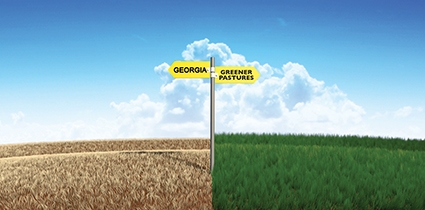Democracy: Getting it Right
OPED
Democracy is a fresh word in Georgia which is gradually acquiring a solid stand in our political culture. We have tasted it and tried to fit ourselves into its universally known rules and accepted norms, but we have not yet become fully aware of it because our national model of democratic context and demeanor still lacks the maturity and attractiveness it usually bears in the countries where it has already acquired enough power to have people behave accordingly and feel comfortable with it.
For many of us, democracy has been a huge pain in the neck up until now. We are somewhere near the field where this tree grows, but we still need to go another mile to get our hands on the fruit it bears, and taste it again and again to get the gist of it faster and surer.
On the other hand, no matter how unhurried the process is, our society is belatedly but confidently turning itself into a democratically-minded sensitive body which is ready to react to every antidemocratic incident that takes place day in day out in this country. And our people’s perseverance here is felt every inch of the way towards what we think democracy must represent and mean.
Ours is a society which needs to be making constant corrections of its behavior on this thorny and bumpy way. Whether our good friends in the democratic West believe it or not, we are diligently trying to introduce such corrections of our collective behavior, although the attempts to do this trigger painful controversy due to continuous differences and clashes between the occurring opinions. For instance, the recent lingua lapsus uttered either incidentally or deliberately by one of the most recognizable and longtime Georgian legislators incensed the members of our ‘not-so-democratic’ society so much that any ‘fully-developed’ democracy would envy the reaction. The insensitive, and I would say, not very knowledgeable parliamentarian, wanted to use certain vocabulary that would unfairly describe our special children, and the kids and moms were immediately out in the street to demonstrate their indignation. This was an attempt to correct the undue behavior in our willing-to become-better society.
Take the risqué issue of same-sex marriages – the discrepancies here are rampant, but the efforts to seek optimal solutions are in place – rather discreetly, though – to save the feeling of cons and to ease the sentiments of pros. Again, this is a desire to introduce a correction in the life of this society of ours.
The proposal of the bill on the offense of religious feelings was curbed as it came out of certain radical legislative hands because it was unanimously considered as wrongly based on the misunderstood relationship between the church and the government. I think the fact is a clearly descriptive example of our readiness to make correction where the correction is asking to be.
There are many established traditions – wrong and right – which our society is living with. Some of the traditions do not any longer play the agreeable role they once played in our society’s everyday life, and we are trying to be judgmental to an affordable extent towards the habits and trends that become irrelevant and detrimental.
Shouldn’t this be reckoned as our desire to make an amendment to what we think is no longer good and right? Let us not forget our people’s almost heroic stand to defend the freedom of means of mass communication. The public position to take to the streets in defense of free media speaks volumes about the willingness of this nation to stand where the rest of the worlds mature democracies stand.
We are a young, maybe even an infantile democracy, and we should certainly learn how to behave, especially if we claim to be an organic part of the civilized world which operates within the system of democratic values. We will never know better unless we get some coaching in the art of democracy and do ample self-training to practice it better.
Nugzar B. Ruhadze












